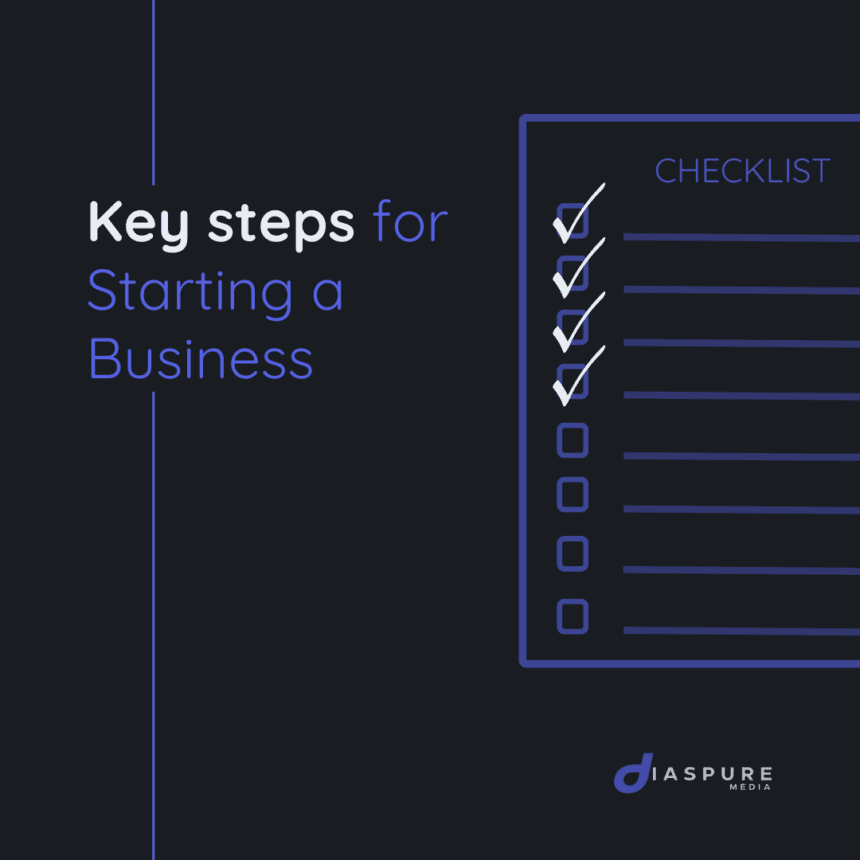Starting a business is a courageous step in any individual’s life. Congratulations to you! Along the journey, there are many steps to be taken, in this post we’ll share a list of key steps, along with a checklist you can use to help you stay on track. Be sure to continue learning and do your own research as this will help you make more informed decisions along the way.
Get the checklist, you can download the light version the dark versions linked below.
1. Business Planning
- Business plan: Write down what your idea is and what problem you’re solving. Clearly define your business idea.
- Market research: Who are you solving the problem for, who else is doing what you would like to do, and what are some opportunities and potential challenges?
- Skill and knowledge check: Do you have the knowledge and skills necessary to pull this off?
- Validate your idea: Do people want what you’re offering? Can you make a profit selling it to them?
- Business structure: Decide on the appropriate legal structure (sole proprietorship, partnership, corporation, or limited liability company).
- Determine your budget: Estimate your current and/or potential costs.
- Determine pricing: Decide how much you will charge for your product or service.
- Mentorship: Seek mentorship as early as possible from experienced entrepreneurs and qualified business advisors to help guide you through the process.
2. Legal and Regulatory Requirements
- Business name registration: Where applicable, register your business name with the appropriate provincial and/or federal authorities.
- Business licenses and permits: Obtain necessary licenses and permits from local, provincial, and federal authorities.
- Tax Registration: Where applicable, register for GST/HST and provincial sales tax.
- Professional Licensing: If required by your industry (e.g., healthcare, law), obtain the necessary licenses.
- Tax and legal professionals: Develop relationships with qualified professionals like tax advisors and lawyers.
- Contracts: Draft client contracts and review them with a qualified legal professional
3. Financial Planning
- Business financing: Secure funding through personal savings, loans, grants, or investor financing.
- Budgeting: Create a detailed budget to track income and expenses.
- Accounting: Set up a system to track financial transactions and prepare financial statements.
- Financial professionals: Develop relationships with qualified financial professionals like accountants and bookkeepers.
- Banking: Open a business bank account.
4. Insurance
- Business insurance: Develop relationships with qualified insurance professionals that offer general liability, property, and professional liability E&O, and other types of business insurance. Also, consider disability insurance and any other options that meet your specific needs.
5. Hiring and Human Resources
- Hiring process: Develop a hiring process and create job descriptions.
- Employee contracts: Draft employment contracts outlining terms and conditions.
- Payroll and benefits: Understand payroll and benefits obligations.
6. Marketing and Sales
- Branding: Develop a strong brand identity, including logo and messaging.
- Website: Create a professional website to showcase your business.
- Digital Marketing: Utilize digital marketing strategies (SEO, social media, email marketing) to reach your target audience.
- Sales strategy: Develop a sales strategy to generate leads and close deals.
- Networking: Build relationships with other entrepreneurs, and potential clients/customers.
Submit a business listing to a business directory to help with SEO and lead generation.
Get help with Digital Marketing, website development, branding, and lead generation.
8. Relationships and Community Building
- Mentors: Build a network of committed mentors to help guide you along your entrepreneurial journey.
- Networking events: Attend industry events to connect with other entrepreneurs.
- Join business organizations: Become a member of relevant business organizations.
- Suppliers: Establish strong relationships with relevant suppliers.
- Customer relationships: Prioritize customer satisfaction and build long-term relationships.
Get help with Customer Service and Customer relationship management.
9. Additional Considerations
- Intellectual property: Protect your intellectual property through patents, trademarks, and copyrights.
- Environmental regulations: Comply with environmental regulations, especially if your business involves hazardous materials.
- Health and safety regulations: Ensure workplace safety and comply with health and safety regulations.
By using this checklist as a general guide and seeking expert advice, you can increase your chances of success as a new entrepreneur in Canada.
Check out a detailed step-by-step guide for starting a business in Canada.
Disclaimer:
Remember, in all that you do we wish you the best, however, the information provided on this site is intended for general informational purposes only and should not be considered professional advice. Be sure to seek professional legal and financial counsel to cater to your specific situation. Learn more in our disclaimer policy.




